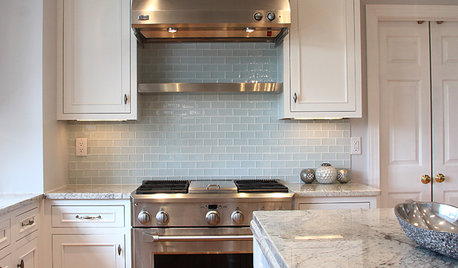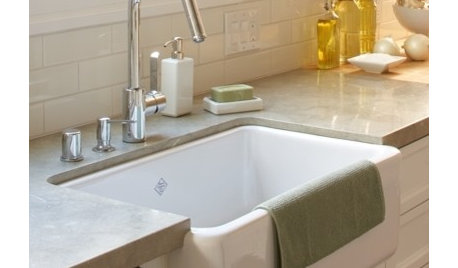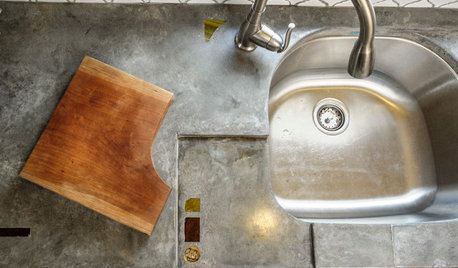Contracting for Countertops
I'm writing to share some of my learning points from the process of looking for countertops - no question to ask here, but please feel free to elaborate with more advice!
Buying the Slabs
The way the industry works in the Chicago area, you find a slab at a slab warehouse and find a fabricator separately - per comments below, this is not the case in all markets though. Here, the slab warehouse generally won't tell the material price or sell a slab directly to the end customer, and will only reserve the slab under the name of a fabricator, but you're free to change the name of the fabricator after you initially reserve the slab so that was not an issue. I found it frustrating that they would not tell me the price, but it seemed so standard as to not be worth fighting. You may find a fabricator who's willing to tell you the material price if you're very concerned about this. Most warehouses would hold the material for 15 days, so it was necessary to move quickly once the slab was found. Most fabricators took a couple of days to come back with an estimate, and some insisted on seeing the house before we could finalize details like where the seams would be, so be ready for this in your planning.
Materials and Sealing
The main countertop materials are Lamitate, Engineered Quartz (usually just called "Quartz"), Granite and Quartzite. Marble, Limestone and Travertine are sometimes used, but etch with acid and stain easily, so they are not a good idea unless you are prepared to be very careful. Engineered Quartz contains resins that are not as heat tolerant as stone, so it's not recommended for a hearth, but it's fine for countertops. The slabs are somewhat smaller than Granite and Quartzite slabs, so you may have more seams with Quartz. Quartzite is a naturally occurring quartz that is harder and more expensive than Granite, and has patterns that are less speckled, more like Marble. Light colored Granite can also stain, but is not nearly as susceptible to staining as Marble. All natural stone should be sealed, and you should pay attention to the timeframe that the sealer is supposed to last, as there are 1 year sealers and "forever" / "10-year" sealers. The latter penetrate deeper and last much longer. Onyx is sometimes used because some Onyx (not all) is translucent and can therefore be backlit. I don't think that Onyx stains or etches, but Onyx does scratch easily because it is not as hard as granite, engineered quartz or quartzite.
Make sure you check the material for cracks and measure accordingly, and make sure you understand how the slabs will be laid out and where there will be seams and how the material pattern will match up at the seams before you buy - slab warehouses will encourage you to buy the material and then let your fabricator help you with this, and certainly you should do the layout in person at the fabricator's, but by then it's too late if it turns out the slabs won't work for you. Bring your own tape measure - some warehouses measure material at the longest point, and if you count on their dimensions you may find that missing corners cause the material not to work for you.
Make sure you understand what your fabricator is willing/able to do regarding seams in the material. My fabricator was willing to fabricate my countertops with fewer seams than others - others were afraid they couldn't get the big pieces up the stairs. I trusted my fabricator that they really could do what they said because they templated the countertop not just with a laser measurement, but with strips of wood that they pieced together, and then tried bringing up the stairwell to be sure they have judged the space right.
I also found it essential to discuss with my fabricator that I hold them responsible for any cracking, even if it's caused by an uneven surface beneath. Many blame the carpentry guys for this if it happens, but in my opinion, it's their fault if they don't detect the issue and they just go ahead and install on top of a bad surface. My fabricator didn't bring levels to his measuring appointment, and I insisted that he come back to verify that the cabinets are level for me before installation. Had I not insisted, they would not have "owned" that part.
I chose my fabricator based on the following criteria:
- They were very responsive during the sales process
- They were willing to modify their contract in a bunch of ways I requested to protect me
- They had no negative reviews on Angie's List, Yelp or Google. They did not have a bad BBB rating. A Google search didn't turn up any negative reviews. Pay special attention to what a company does when something goes wrong - everyone has a good experience when things go well, but if the material cracks, etc., do they make the customer good?
- They had been incorporated for a while (Disreputable companies often get dissolved and reincorporated under a new name to reduce their liability. Also, some companies let their incorporation expire - in that case, you may not be protected even if they show you an insurance document
- The principal of the business was listed on the incorporation record
- They had no circuit court lawsuits against them (in Illinois, the circuit court records are available online. Some states may not make this info as easily available, but you should see what you can find out here if it's accessible - I found a couple of companies that had no negative reviews online but a court case search revealed a checkered history)
- They had the required licenses - licensing requirements vary, but check with your city and state, and if your state or city requires licensing, check that they have what they should have
- They had appropriate insurance - They should be willing to get your property listed on their liability insurance for the job, and they should either have workman's comp or have only the principal of the business and subcontractors working on your job (so that they don't require workman's comp). They should also have commercial auto insurance, and ideally an insurance bond that will cover the cost if something goes wrong. I always try to verify insurance directly with the insurer as well, figuring anyone can print a piece of paper that SAYS they have insurance. Not all insurers will release this info though.
Contract:
I added a lot of protections to my contract as well. I recommend that you get all the details of the job into the contract (the kind of edges, the fact you sign off on the slab layout in writing, the gap tolerance for seams, etc.) in writing, along with delivery dates, consequences if they are not met, what will happen if the material is cracked during fabrication, details of how and when the material will be sealed, etc. . You should also explicitly say who will own any material remnants. I found that getting these things into the contract is NOT common, and half of the companies got very skittish with all my insurance questions and contract requirements. Some decided not to do business with me because I insisted on this, so if you do all the things I recommend here, you should be prepared for that. One company that I'm quite sure is reputable got nervous and decided to back out - I sympathize with that company, as there is certainly fraud that happens on both sides of these deals, and some consumers are very unreasonable in their demands... but still, I did not want to do business with a company that didn't have enough faith in their own quality to add quality assurances to the contract. I did find that going through the language together on the phone and finding language acceptable to both parties was very important - I did not just send my language into the ether and expect them to accept it verbatim. Also, I anticipated their concerns and explained up front that what I was doing was ensuring due diligence and clarity for both parties' benefit, and that just as I would ask that they be up-front and take ownership of meeting quality standards, I would handle my own responsibility for being clear in my requirements and being reasonable in my requests.
It's important to make sure that both parties sign the contract, and that both parties initial every page of the contract - avoids any confusion should an issue arise.
In Illinois there are some legal protections that apply only if the contract is signed at your home. Not sure about other states, but you may want to consider this.
Here is the text I got added to my contract - I forgot to get the way the granite would be sealed put in, but should have. We also dealt with removal of existing countertops / vanity tops separately, but you should be sure to discuss how that will be handled, and get it into the contract if needed.
Payment Terms Modification:
The balance is due when all work has been completed, all pieces that do not require installation have been delivered and releases of lien have been received from all subcontractors on the project
Other items to add to the contract:
o Fabricator is responsible for providing countertops and other pieces that have not been broken, cracked or chipped during fabrication or installation, that do not have seams larger than 1/16", that are cut to the correct size to be flush against the wall (if the wall is crooked, it is understood that there may be small gaps because the material is cut straight and the wall is not straight, but the material edge will be parallel to the wall and will touch at least at some points). Fabricator and customer will sign off on how the pieces will be laid out in the slabs. Any deviations require an additional signoff in writing in advance.
o In the event the above requirements are not met, the customer shall have the choice of either having the stone repaired as much as is possible and receiving a reasonable discount, or having the items refabricated with new material. If the new material costs more than the original material, the customer will pay the difference in price at the actual difference in the cost that is charged by the stone supplier to the fabricator. If the new material costs less than the original material, the customer will receive a discount equal to the actual difference in the cost that is charged by the stone supplier to the fabricator.
o Fabrication will be completed by a date that is no more than 1 month from the date when the proposal is signed. If fabrication was successful, an installation date will be offered to the customer within 2 weeks of that time. If there are issues with fabrication or installation that require refabrication, then refabrication will be completed within 1 month of the customer selecting replacement material, and an installation date will be offered to the customer within 2 weeks of that time. If fabrication and installation are not completed successfully the second time, the customer will have the choice to either continue with a third attempt or to have all money refunded.
Visiting Suppliers
I found that slab warehouses were mostly only open weekday business hours and Saturday mornings, and some only by appointment, so it was important for me to plan my trips to them accordingly.
I found that there were also some fabricators who had slab collections. To use their slabs, you have to fabricate with them, but this can be a fine option if it's a reliable company.
Slab warehouses generally do NOT have remnants (smaller leftover pieces of stone). If you need one of these, call around to fabricators to see who has one. They will often sell you just the remnant, sometimes will insist that you fabricate it with them.
This part is only relevant to the Chicago market, but here's the list of slab warehouses I found:
- Terrazo & Marble Supply - 2 locations - loop and Wheeling. Requires an appointment to come in Wed evening or Saturday morning.
- Cosmos - west suburbs
- American Granite- west suburbs
- Daltile- west suburbs
- Damar (appointment only) - north suburbs
- Levantina- west suburbs
- Universal Granite and Mable Supply - Chicago south side
- Marble & Granite Supply - Niles.
- Stone Design - west suburbs
- MSI - west suburbs
These fabricators also have some nice slabs on hand, but you have to use them as your fabricator if you buy their slabs:
- Precision Stone Design - western suburbs
- Stone City - Chicago north side
For remnants, I found that the following companies had nice assortments - most slab warehouses do not have remnants, because those are left over during fabrication. Be aware that you may want to talk about buying a remnant OR about doing your fabrication with a company. If they have a remnant you want, but you had them estimate fabrication and then decided not to use them, they may be annoyed and refuse to sell you the remnant at that point:
- Stone City
- Sprovieri's
Good luck with your projects!
Basic legal disclaimer: I have no affiliation with any of the companies mentioned in this review (except as a customer for my current remodel). Please verify everything I say here for yourself, and use your own judgment. If there are any inaccuracies in what I said, it's unintentional, but I do not take on any responsibility for consequences if you don't check the advice out for yourself before following it.
This post was edited by GardenerDev on Sun, Jan 26, 14 at 21:41




















Joseph Corlett, LLC
GardenerDevOriginal Author
Related Professionals
Montrose Kitchen & Bathroom Designers · Pleasanton Kitchen & Bathroom Designers · Citrus Park Kitchen & Bathroom Remodelers · Green Bay Kitchen & Bathroom Remodelers · Jefferson Hills Kitchen & Bathroom Remodelers · Morgan Hill Kitchen & Bathroom Remodelers · Sharonville Kitchen & Bathroom Remodelers · East Saint Louis Cabinets & Cabinetry · Bon Air Cabinets & Cabinetry · Citrus Heights Cabinets & Cabinetry · Wildomar Cabinets & Cabinetry · Corsicana Tile and Stone Contractors · Edwards Tile and Stone Contractors · Mililani Town Design-Build Firms · Yorkville Design-Build Firmssixkeys
GardenerDevOriginal Author
debrak2008
annac54
sjhockeyfan325
snoonyb
GardenerDevOriginal Author
snoonyb
GardenerDevOriginal Author
snoonyb
mdln
Joseph Corlett, LLC
emmybean
sjhockeyfan325
GardenerDevOriginal Author
mdln
GardenerDevOriginal Author
mdln
emmybean
sjhockeyfan325
feisty68